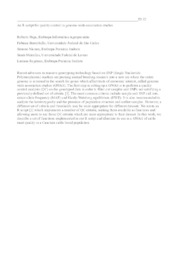An R script for quality control in genome-wide association studies.
An R script for quality control in genome-wide association studies.
Author(s): HIGA, R.; BARRICHELLO, F.; NICIURA, S.; MEIRELLES, S.; REGITANO, L.
Summary: Recent advances in massive genotyping technology based on SNP (Single Nucleotide Polymorphisms) markers are pushing animal breeding research into a new era where the entire genome is screened in the search for genes which affect traits of economic interest, called genome wide association studies (GWAS). The first step in setting up a GWAS is to perform a quality control analysis (QC) on the genotyped data in order to filter out samples and SNPs not satisfying a previously defined set of criteria [1]. The most common criteria include sample and SNP call rate, minor allele frequency (MAF) and Hardy-Weinberg equilibrium (HWE). It is also recommended to analyze the heterozygosity and the presence of population structure and outlier samples. However, a different set of criteria and thresholds may be more appropriate for different datasets. We wrote an R script [2] which implements a number of QC criteria, making them available as functions and allowing users to use those QC criteria which are more appropriate to their dataset. In this work, we describe a set of functions implemented in our R script and illustrate its use in a GWAS of cattle meat quality in a Canchim cattle breed population.
Publication year: 2011
Types of publication: Abstract in annals or event proceedings
Observation
Some of Embrapa's publications are published as ePub files. To read them, use or download one of the following free software options to your computer or mobile device. Android: Google Play Books; IOS: iBooks; Windows and Linux: Calibre.
Access other publications
Access the Agricultural Research Database (BDPA) to consult Embrapa's full library collection and records.
Visit Embrapa Bookstore to purchase books and other publications sold by Embrapa.

